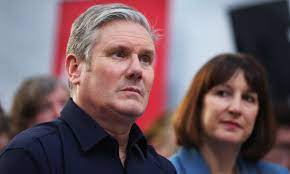Owen Jones
Do children deserve to be driven into poverty? While a Conservative politician is unlikely to answer such a question with an affirmative, their deeds say otherwise. When George Osborne limited child tax credit and universal credit to two children, he was punishing young people with hardship because of something entirely outside their control: being the third or fourth child instead of the first or second.
For Labour, the answer should be obvious: scrap the policy, because no child should be punished with poverty. Whatever New Labour’s failings, it succeeded in scooping a million children out of poverty. Since then, the two-child benefit cap has driven 250,000 children into poverty, and another 850,000 deeper below the breadline. Crucially, it has failed on its own stated terms of encouraging parents to take up more hours or find work. It hammers working households – the children of care workers, checkout assistants, cleaners – and those out of work alike. An exemption exists in theory for cases of rape or coercion, but the process of informing the government is onerous and potentially traumatic: most of those eligible, therefore, do not do so. As a new report by academics at York University underlines, people’s circumstances change, whether due to job losses or relationship breakdown. Many families aren’t even aware of the cap until after their third child arrives, and they want to claim benefits.
Labour’s leading lights know this policy is an abomination: the shadow work and pensions secretary, Jonathan Ashworth, described it recently as “heinous”, and back in 2020, the deputy party leader, Angela Rayner, declared that “the obscene and inhumane two-child cap must go”. When standing for the Labour leadership, Keir Starmer, too, said it had to go. And yet, as leader, he has now declared that this Tory policy – one his party regards as heinous, obscene and inhumane – will stay. What is Labour’s purpose when shadow cabinet ministers anonymously brief that the party won’t have the money to tackle child poverty in its first term in office?
Those who value money over human life point to the supposed burden on the taxpayer, even though abolishing the cap would cost £1.3bn, a relative pittance at about a tenth of one per cent of government annual spending. Yet Britain’s falling birthrate will exact its own growing cost on the state, as an expanding ageing population is supported by a shrinking workforce. This is causing panic among Tory MPs such as Miriam Cates, who describes it as the country’s most pressing issue but blames “cultural Marxism”: she would do better to consider how her party penalises children rather than resorting to sinister dogwhistles. Condemning children to poverty exacts other costs, too: they are more likely to suffer ill health, burdening the NHS, and they are less likely to realise their educational potential, which holds the country back.
If this isn’t an existential question for Labour, then what is? The shadow chancellor, Rachel Reeves, is sending personal letters to rich Tory donors inviting them to one-on-one breakfasts: it takes little imagination to understand what assurances they will seek, not least promises that their taxes won’t be hiked. So, on the one hand, Labour woos rightwing tycoons who want reassurances the party will leave their wealth untouched, and on the other, it endorses “heinous” Tory policies that condemn children to hardship and misery.
This is a basic abdication of the party’s founding mission. Labour was founded to improve the lot of the working class, on the basis that the two existing parties – the Liberals and the Tories – were there to champion the business class. The party’s justification for not eradicating child poverty was the same argument used by Osborne: that there is no money to do so.
Labour could raise revenue by asking the well-to-do to pay more in tax but chooses not to do so. Instead, the party claims its demands will be met with more economic growth – an argument no different to that of the Tories. Growth without redistribution merely shovels more wealth into the bank accounts of the already well off: that is what our economic model – which Labour plans to leave untouched – achieves in spades. Little wonder that Osborne himself declares “it wouldn’t be terrible for the country” if Starmer and Reeves were in government. Gordon Brown may have failed to deliver an alternative economic model to Thatcherism, but he clearly had a passion for lifting children out of poverty. There seems to be no similar influential figure who would drive such an agenda in the next Labour government. The cost of that will be hundreds of thousands of children condemned to poverty, in a betrayal not just of their future, but the country’s too.







